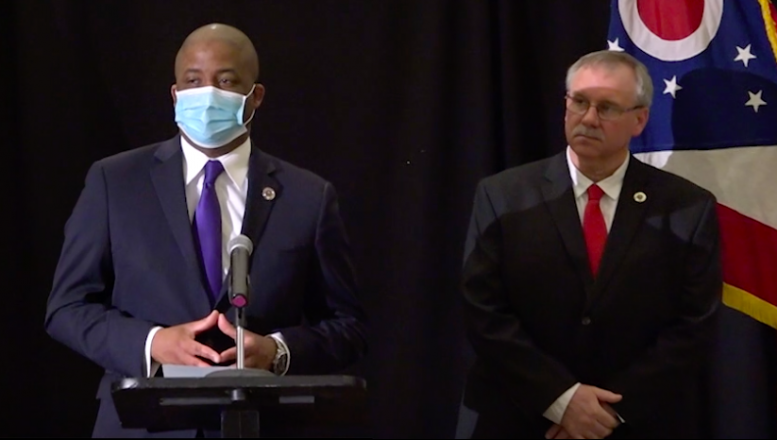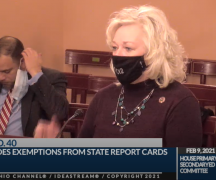By Susan Tebben
A bipartisan group of Ohio legislators have set their sights on the state’s school report card system, aiming to eliminate the letter grades they say are misleading and unfair.
State Rep. Don Jones, R-Freeport, and Rep. Phil Robinson, D-Solon, introduced a bill to get rid of elements of the state report card including the letter grade designation after studying the effects and usefulness of the grades over five years.
“Our report card has been used as a document that pits one school against another, or one district against another, based upon the overall letter grade,” Jones said in a Wednesday press conference on the new legislation.
A work group began looking at the school ranking system as part of the state operating budget bill in 2019.
Jones said that study came up with a list of potential recommendations but “really no resolution of where do we go from here.”
During discussions about the EdChoice private school voucher program, Robinson said everyone that testified brought up flaws in the state report card.
“The more we heard about, the more we listened to the testimony, it was clear that that’s one piece at the heart of systemic change that needs to happen in education policy in the state of Ohio,” Robinson said.
Rather than an A through F standard on the report card, the new system would six new designations: significantly exceeds expectations, exceeds expectations, meets expectations, substantially approaching expectations, moderately approaching expectations and in need of support.
“To say that someone is failing is one thing, to say that someone is in need of support is another thing,” Jones, a former educator, said of the lowest ranking.
The new report cards will also include more detail about each school, so those looking for the achievements and flaws of a school will have to read the entire report, Jones said.
After bringing together another group of school superintendents and legislatures in January of 2020, Jones said simple goals for the ranking system were formed, leading to the current bill.
One of the superintendents involved in that work was Cameron Ryba, of Strongsville City Schools, who called the current report card “truly an arbitrary system.”
“It’s an arbitrary system that is giving an incomplete assessment of complex organizations, with a focus on punishment instead of praise, with a focus of gotcha instead of growth,” Ryba said on Wednesday.
Another member of the work group was Marlon Styles, superintendent of Middletown City Schools. Styles is also a part of the work group focusing on the comprehensive education overhaul currently proposed as House Bill 1, to change the funding formula, something informed by the report card ranking system.
Styles said the report card legislation shifts the state away from punitive measures and a system “that has practices that are biased.”
“Ohio has an obligation to build strong children,” Styles said.
The bill currently has 58 cosponsors, according to Jones and Robinson, which are from both sides of the aisle.
It will be sent to the House Committee on Primary and Secondary Education for review.
***
Also from Ohio Capital Journal:
Lawmakers pass bill to let them rescind health orders, setting up clash with DeWine
The Ohio General Assembly approved a bill Wednesday to allow lawmakers to strike down health orders they disagree with, sending the legislation to a governor who has already vowed to veto it.
Republican leaders in the Ohio House of Representatives and Ohio Senate committed to holding votes to override Gov. Mike DeWine’s veto of Senate Bill 22.
This marks the latest showdown in a yearlong disagreement between the Republican governor and legislators within his own party on the response to COVID-19. DeWine has defended the aggressive steps taken by his office and the Ohio Department of Health as being necessary to prevent the spread of coronavirus. Lawmakers have widely condemned the response as being too heavy-handed and not appropriately considering input from the legislative branch.
SB 22, introduced by GOP Sens. Rob McColley of Napoleon and Terry Johnson of McDermott, would give lawmakers the power to rescind public health orders they disagree with via passing a concurrent resolution. (State Rep. Haraz Ghanbari, R-Perrysburg, is a co-sponsored.) They could strike down a health order the same day it is issued. READ MORE
Women’s health clinics: Abortion disposal law creates ‘impossible situation’
A bill signed into law mere months ago regarding the disposal of surgical abortion tissue is being challenged in court, with women’s health clinics saying the bill creates “an impossible situation” for them.
The complaint, filed in the Hamilton County Court of Common Pleas by the ACLU, Planned Parenthood, women’s health clinics across the state and one doctor, argues that Senate Bill 27 creates rules and regulations that clinics won’t find out about until after the law takes effect. (State Rep. Haraz Ghanbari and State Sen. Theresa Gavarone, both co-sponsored the legislation.)
The law is set to take effect on April 6, and when it takes effect, the Ohio Department of Health must implement rules on what proper disposal of tissue and materials looks like for those clinics, to avoid misdemeanor criminal charges.
“We simply want reassurance that we won’t be punished for our inability to comply with a directive that doesn’t exist,” the groups said in a joint statement. READ MORE
HELP OHIO CAPITAL JOURNAL GROW Make a tax-deductible donation.





